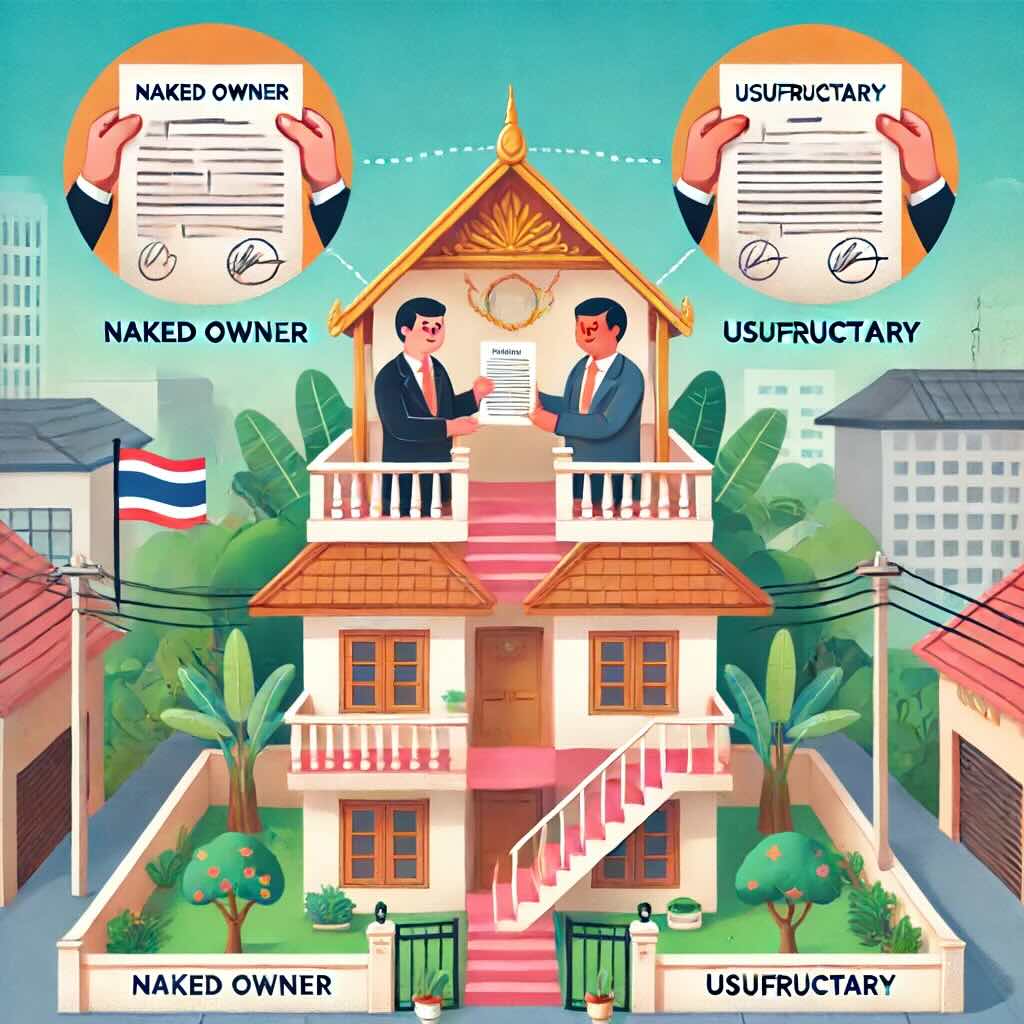Usufruct in Thailand
Steps to Establish a Usufruct in Thailand
- Agreement: The owner of the property must agree to grant the usufruct. This is typically formalized in a written agreement between the owner and the usufructuary.
- Notarization: The agreement should be notarized to ensure its legal enforceability. This involves having the document signed in front of a notary public.
- Registration: To fully establish and protect the usufruct, it must be registered with the local Land Office where the property is located. This is crucial as it provides public notice of the usufruct and protects the rights of the usufructuary against third parties.
- Documentation: The following documents are generally required for registration:
- The usufruct agreement, signed and notarized.
- Identification documents of the owner and the usufructuary (e.g., passports, Thai ID cards).
- The title deed of the property.
- Application forms provided by the Land Office.
- Land Office Procedure: At the Land Office, the officials will:
- Review the agreement and the supporting documents.
- Record the usufruct on the title deed of the property.
- Issue a new version of the title deed noting the usufruct.
Legal Provisions for Usufruct
- Duration: A usufruct can be established for a specific period or for the lifetime of the usufructuary (Section 1418).
- Rights and Obligations: The usufructuary has the right to possess, use, and manage the property. They must act as a prudent administrator and cannot alter the property’s substance (Sections 1421-1422).
- Transferability: The usufructuary cannot transfer their rights to another person unless explicitly stated in the agreement (Section 1423).
Key Sections of the Thai Civil and Commercial Code
- Section 1417: Definition and creation of usufruct.
- Section 1418: Duration of usufruct.
- Section 1421: Rights of the usufructuary.
- Section 1422: Obligations of the usufructuary.
- Section 1423: Transferability and limitations of usufruct rights.
- Section 1428: Termination of usufruct.

Extra Information about Usufruct in Thailand
Understanding Usufruct in Thailand: Legal Framework and Practical Applications
A usufruct in Thailand is a legal right granted to an individual (the usufructuary) to use and derive profit from a property owned by another person (the naked owner) without altering the property’s substance. This legal arrangement is extensively covered under Sections 1417 to 1428 of the Thai Civil and Commercial Code. The concept of usufruct is particularly valuable in property management and inheritance planning, offering a flexible mechanism to manage and utilize property rights.
Legal Provisions Under the Thai Civil and Commercial Code
Definition and Creation (Sections 1417-1418)
A usufruct is established when the owner of immovable property grants another person the right to use and enjoy the benefits of that property. The usufructuary is entitled to the property’s fruits, such as rental income, while the ownership remains with the naked owner. The usufruct can be granted for a specific period or for the lifetime of the usufructuary, but not exceeding 30 years if a fixed term is set.
Rights and Obligations (Sections 1421-1422)
The usufructuary has the right to possess, use, and manage the property as a prudent administrator. They are responsible for the maintenance of the property and must act in a manner that preserves its value. They cannot alter the substance of the property or use it in a way that damages it. The usufructuary is also responsible for paying any property taxes and associated expenses during the term of the usufruct.
Transferability and Limitations (Sections 1423-1424)
While the usufructuary enjoys extensive rights to the property, these rights are not easily transferable. The usufructuary cannot transfer their usufruct rights to another person unless explicitly stated in the usufruct agreement. This limitation ensures that the usufruct remains personal to the usufructuary, preserving the naked owner’s ultimate control over the property.
Termination (Section 1428)
A usufruct can terminate upon the expiration of the agreed period, the death of the usufructuary if it was granted for their lifetime, or the destruction of the property. Additionally, if the usufructuary misuses the property or causes significant damage, the owner can request the termination of the usufruct through legal means.
Practical Applications of Usufruct
Usufructs are commonly used in Thailand for various practical purposes:
- Inheritance Planning: Property owners often grant usufructs to their heirs, allowing them to use and benefit from the property during their lifetime while ensuring that ownership remains within the family.
- Real Estate Investments: Investors use usufructs to manage rental properties, enabling them to generate income from the property without owning it outright. This can be particularly beneficial for foreign investors who are restricted from owning land in Thailand.
- Family and Marital Agreements: In cases of second marriages or blended families, usufructs can ensure that a surviving spouse can live in the family home while preserving the property’s ownership for the children from a previous marriage.
Legal and Financial Considerations
Creating a usufruct involves a formal agreement between the property owner and the usufructuary, which should be notarized and registered with the local Land Office to be legally enforceable. The registration provides public notice of the usufruct, protecting the rights of the usufructuary against third parties.
While usufructs provide significant benefits, they also come with responsibilities. The usufructuary must maintain the property and cannot engage in activities that could devalue it. It is essential to carefully draft the usufruct agreement to outline the rights and obligations clearly, ensuring compliance with Thai law.
Conclusion
A usufruct is a powerful legal tool within the Thai Civil and Commercial Code, offering flexible and practical solutions for property management and inheritance planning. By understanding the legal framework and practical applications, individuals can effectively utilize usufructs to manage and benefit from property while preserving ownership rights.
What to do Now
To establish a usufruct, ensure you have a clear agreement, notarize the document, and register it with the Land Office. This process protects your rights and ensures the usufruct’s enforceability under Thai law. Contact TFL at info@thailandfamilylaw.com


